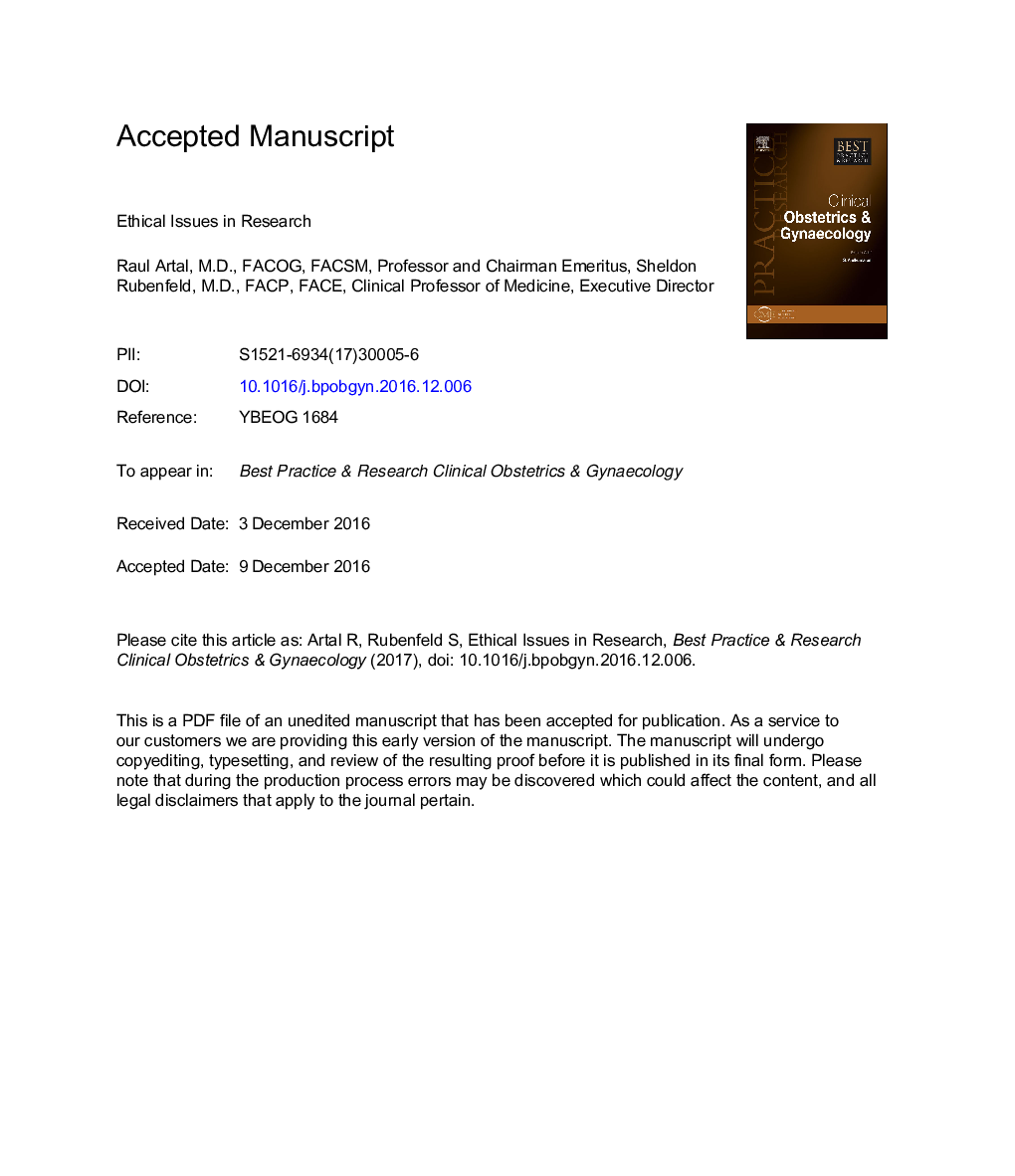| کد مقاله | کد نشریه | سال انتشار | مقاله انگلیسی | نسخه تمام متن |
|---|---|---|---|---|
| 5691393 | 1599297 | 2017 | 13 صفحه PDF | دانلود رایگان |
عنوان انگلیسی مقاله ISI
Ethical issues in research
ترجمه فارسی عنوان
مسائل اخلاقی در پژوهش
دانلود مقاله + سفارش ترجمه
دانلود مقاله ISI انگلیسی
رایگان برای ایرانیان
ترجمه چکیده
تحقیقات بیومدیکال در حال حاضر بر اساس استانداردهای اخلاقی است که طی قرن ها تکامل یافته است. حوادث تاریخی و سیاسی، ملاحظات اجتماعی و حقوقی، و پیشرفت های مداوم پزشکی و تکنولوژیکی به اخلاق و عمل تحقیق غالب منجر شده است. در حال حاضر بیماران و افراد تحقیقاتی در حین مراقبت های پزشکی و یا داوطلب شدن به عنوان افراد تحقیقاتی، خودمختاری کامل دارند. داوطلبان ثبت نام در تحقیقات انسانی شامل یک رضایت دقیق و معنی دار رضایت بخش است که به اصول کلیدی اخلاق پایبند است: خودمختاری، خیرخواهی، عدم پذیرش و عدالت. این اصول به تدریج پس از جنگ جهانی دوم اتخاذ شد، عمدتا در پاسخ به رفتار غیر اخلاقی پزشکان و دانشمندان آلمانی در طی رایش سوم. این بررسی بر اهمیت نقاط عطف تاریخی و نقش اساسی اخلاق در تحقیقات پزشکی معاصر تاکید دارد. پروتکل های تحقیقاتی باید حداکثر سود جامعه را به دست آورند، ارزش بالینی و علمی داشته باشند، باید بررسی مستقل، احترام به شأن انسانی، و اصول رضایت آگاهانه را دنبال کنند و مهمتر از همه، افراد باید دارای استقلال کامل باشند. با این حال، اصول و مقررات فعلی نمی توانند هر موقعیت قابل تصور را پوشش دهند، به خصوص با توجه به پیشرفت های جدید در علم و فناوری. فن آوری پزشکی جدید، در حال توسعه، تحقیق ژنتیکی، مداخلات درمانی و نوآوری ها به جامعه هجوم می آورند تا بالاترین اصول اخلاقی و اخلاقی را حفظ کنند.
موضوعات مرتبط
علوم پزشکی و سلامت
پزشکی و دندانپزشکی
زنان، زایمان و بهداشت زنان
چکیده انگلیسی
Biomedical research is currently guided by ethical standards that have evolved over many centuries. Historical and political events, social and legal considerations, and continuous medical and technological advances have led to the prevailing research ethics and practice. Currently, patients and research subjects have complete autonomy while under medical care or when volunteering as research subjects. Enrolling volunteers in human subjects research includes a detailed and meaningful informed consent process that follows the cardinal principles of ethics: autonomy, beneficence, nonmaleficence, and justice. These principles were gradually adopted after World War II, primarily in response to the unethical behavior of German physicians and scientists during the Third Reich. This review emphasizes the importance of historical milestones and the essential role that ethics has in contemporary medical research. Research protocols should achieve maximum benefits for the society, have clinical and scientific value, be subject to independent review, respect human dignity, and follow the principles of informed consent, and most importantly, subjects should have complete autonomy. However, current principles and regulations cannot cover every conceivable situation, particularly in view of the new advances in science and technology. New and evolving medical technology, genetic research, therapeutic interventions, and innovations challenge society to maintain the highest moral and ethical principles.
ناشر
Database: Elsevier - ScienceDirect (ساینس دایرکت)
Journal: Best Practice & Research Clinical Obstetrics & Gynaecology - Volume 43, August 2017, Pages 107-114
Journal: Best Practice & Research Clinical Obstetrics & Gynaecology - Volume 43, August 2017, Pages 107-114
نویسندگان
Raul (Professor and Chairman Emeritus), Sheldon (Clinical Professor of Medicine, Executive Director),
